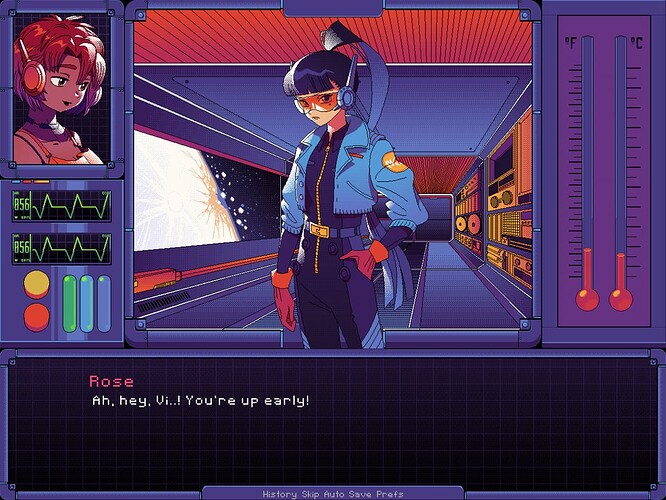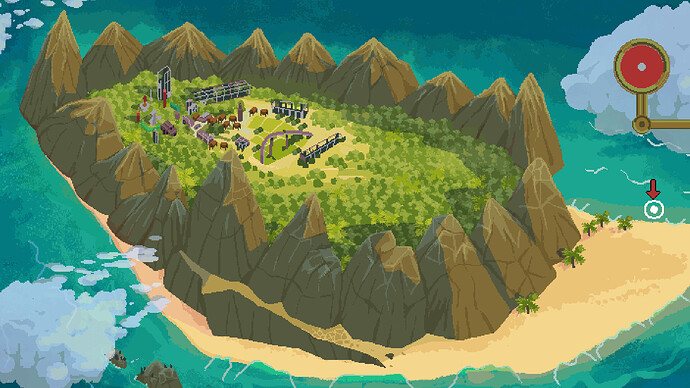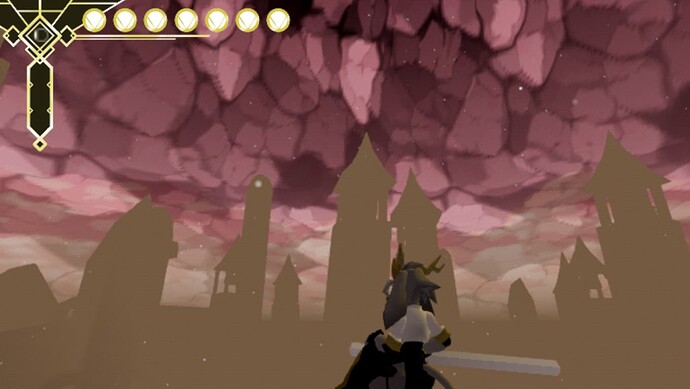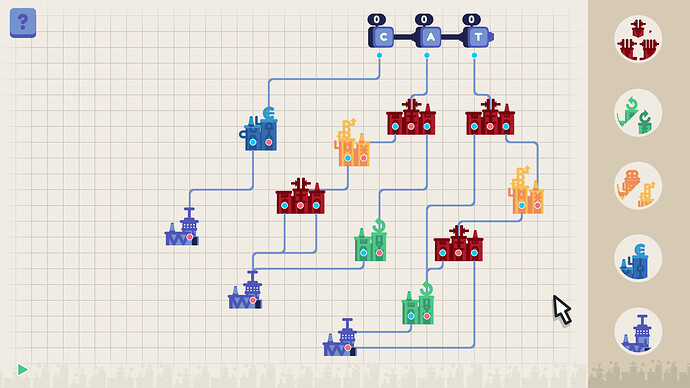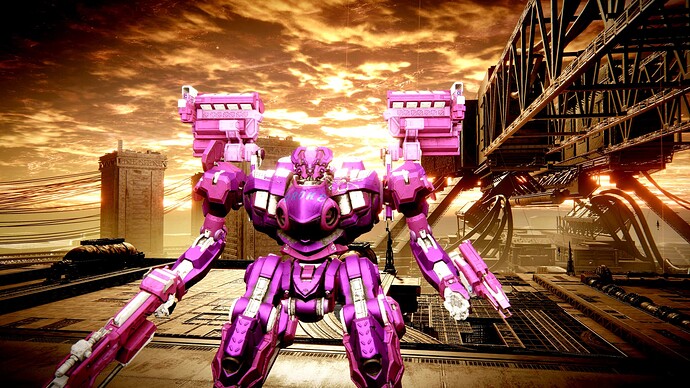the moon looks beautiful tonight
A fairly short (a couple of hours long to play through) visual novel about fear of the unknown in a world where the moon catastrophically slipped free of the Earth’s orbit. Rose and Violet are mechanics stranded on a satellite, their precarious lives sustained by the Heart of the Moon, until unexpectedly it stops entirely and they need to keep themselves together and do something about it.
the moon looks beautiful tonight is a really neat experience. I like these characters and their dynamics. I like the aesthetic of the game. I like the ambiguity of its narrative. There’s so much here that’s left up to interpretation, from wider worldbuilding, to even the precise reality of some of the scenes that unfold.
Its the kind of game, in the exact right genre and subject matter that I could easily have wept at this game and declared it my game of the year. Unfortunately for me I can be slow on the uptake sometimes and the ambiguity of one of the biggest moments of the narrative caused me to have to go back and reread to form any kind of understanding. As much as I love the beautiful way in which it tells its story, for me (an idiot) it can be a barrier that pulls me out of the emotional moment and prevents it from having as much of an impact.
Perhaps a second playthrough at some point in the future would really get me to feel that moment, and I believe it does have a ton of emotional weight behind it.
Golden Idol Mysteries - The Lemurian Vampire
(see my January 2023 Games of the Month post for my thoughts on The Case of the Golden Idol base game (number 12 on the list) and my May 2023 Games of the Month post for my thoughts on the first DLC The Spider of Lanka (number 5 on the list))
It’s good. I love Case of the Golden Idol and this does just as good a job as the main game at giving me some tricky mysteries to unravel with a neat overarching mystery. The last DLC had a bit of a problem with its pacing and struggled to integrate the resolution of the overarching mystery with the events of its third case. This one did not have that problem.
If I were to nitpick a little I might say that the third case required a touch more speculation than usual. With that one there were moments where I only pieced together the exact events that transpired because of the construction of the sentence in the thinking panel.
One thing that this DLC does which is neat, if has multiple moments in time that you can search in the exploration phase. It’s neat and allows for another level of puzzle solving that I found to work particularly well in the second case.
Narratively I think the Case of the Golden Idol has done a really good job of supplementing its main narrative with these little DLCs. They’ve very effectively built a complete timeline for the Golden Idol so thoroughly that it doesn’t feel disappointing that this narrative is over. I really really hope we get more games in this style. It has been one of my favourite games to play this year and I would so happily complete more little puzzles in this style.
Psuedoregalia
Psuedoregalia is a neat psx style 3d platformer. The direct narrative as communicated to you through the game is pretty minimal. I knew that the protagonist was a cool goat lady called Sybil that the internet loves. I eventually learned that my goal was to rescue a princess. I genuinely learned more about the narrative just reading the steam description during writing this than I ever did in the game.
And I think that sort of suits the game as a throwback to ps1 style games where you’re mostly operating on vibes. The vibes of this world are perfect. Lots of people have made a Dark Souls kind of comparison, due to exploring a world that feels vaguely ruined. I don’t disagree but for me it was sort of evoking Ico. It has a sort of tranquility that you never really find in a Dark Souls game. And combat is 100% not the focus of this experience.
One thing this game doesn’t have that it really feels like it could do with is a map. I’m pretty good at piecing together an environment in my head by exploring but this is a complicated series of environments. A map would be extremely helpful even if just for remembering where the heck I haven’t been yet. This game is so open that sometimes it can be difficult to know where to go next.
One time I wandered through a completely black environment I didn’t have the upgrade to get yet and ended up down a deep hole on the other side, convinced I was stuck and had to reset to my last save. (In actuality there were places I could have gone, but one way I was convinced I didn’t have a necessary upgrade for and the other really really looked like a dead end.)
The platforming is too hard for me honestly. It’s designed in such a way that I bet that people who love complicated jumping tech would love this game. The wall kick, even at the end of the game I was still accidentally kicking away from platforms I wanted to jump to. And some of the area design felt really unintuitive about which way I was expected to be going.
So it’s not 100% my cup of tea but I did enjoy my time with it and cannot deny the beauty of this empty eerie world.
Word Factori
Word Factori is a little factory puzzle game thing. It does the thing that Zachtronics games do of whenever you finish a level you get the histograms showing how you did in various stats as compared to other people who finished the puzzle.
It’s okay. In some ways it is a fun little experience. Your only resource is the letter I and there are various structures you can place that affect whatever is input in the same way. Like one rotates whatever is in there, one bends it, one merges two inputs etc. The merger and the bender very specifically will only ever produce a result that is a letter (or sometimes a symbol but not all symbols are craftable). If there isn’t a letter that the thing you’re doing could reasonably create the process will fail.
So the main appeal of the game becomes working out the processes that exist to make the letters you want. Every level where you get a new letter to try to puzzle out you get to do a little experimentation. And every letter has multiple ways of being made, encouraging you to experiment to fill up your recipies journal.
Unfortunately sometimes it really feels like it comes down to guesswork. One late game level wants you to produce an @ symbol so my first instincts were to make like a lowercase q and try to merge it with a c and a flipped c or merge it with brackets. The thing that it actually wanted me to do felt counterintuitive to me. Ultimately when you make a game like this that relies on bespoke interactions for each letter with each machine, you run the risk of making something where the player just has to intuit the thing you were thinking of and it doesn’t always land.
As to the factory aspect of the game. I don’t know. I didn’t really engage with it too hard. It’s very open-ended compared to a Zachtronics game I thing. On most levels you don’t have any limitations on the number of buildings you can have, and the fact that you only have one resource that can become anything reduces complexity quite a bit. I never felt a desire to go back and lower my histograms.
There are challenge levels where you are limited in the number of the different buildings you can have, and I liked those mostly. But again it was for the reason that suddenly I have to create a specific letter without using the building that I’ve always relied on to make it, and thus I have to go back to experimentation and discover a new way of doing this thing.
Overall the concept doesn’t quite adhere together the way I think it was intended to, but there is fun to be had with the experimentation, while it lasts.
Armored Core VI: Fires of Rubicon
(for some reason forgie’s computer hates to take screenshots in hdr mode. i’ve manually adjusted the brightness on this one to make it a pretty good approximation of how the game looks, but it might be off a little)
I’m the least qualified person on the planet to have an opinion on this game. I don’t know any previous Armored Core lore. I didn’t pay any attention to plot events or characters in this game except when Carla was on screen. My brain shut down any time I tried to look at the stats of my robot and I had to recruit Forgie to buy and fit new parts for me. I don’t really engage with things about mechs, they all kinda look the same to me. I couldn’t even enjoy being constantly referred to as a dog and having a handler because I’m too gay to be owned by a man.
But I did have fun with it in some places though. Once I had a setup I liked I was able to really get into the combat in a sort of ‘disengage the brain, just dodge and vibe’ way and which was really fun. When it worked it really worked and everyone’s very happy for me that I killed Balteus in a single attempt.
However when it didn’t work (most notably the furnace and ibis) it really didn’t feel like there was anything I could do about it. The lack of any level grind/way to get noticably more powerful just kind of means if you’re just not good at a fight if it doesn’t click with you even when you do the recommended strategy then fuck you. Fighting against Ibis in particular just felt like an exercise in futility. I could barely scrape through the first phase and then oh cool a whole new phase a whole new health bar god I love it when video games do that.
In conclusion it’s okay. It’s very for me in just the flow of combat, but absolutely not for me in a myriad of other ways. Also Carla should have called me her dog more often.
